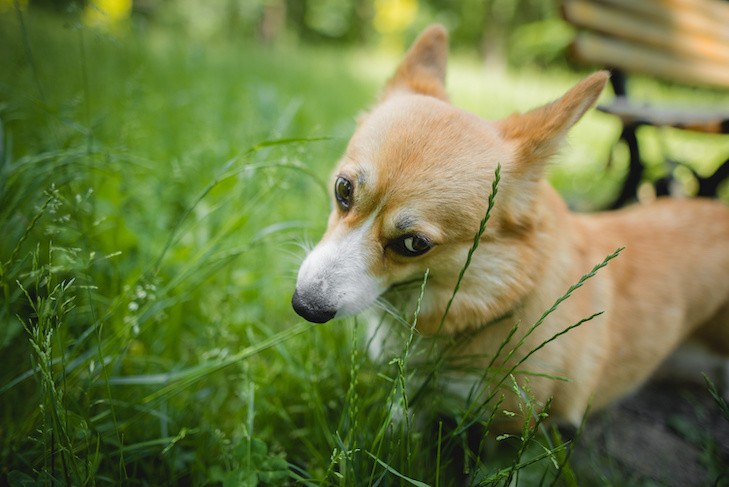Why does my dog eat poop? At WHY.EDU.VN, we understand your concern and disgust. Coprophagia, the act of eating feces, is a behavior that can be addressed with the right approach, ranging from dietary adjustments to behavioral training. We’ll explore the reasons behind this behavior and offer practical solutions. Improve your dog’s health and behavior today with expert guidance on coprophagia prevention.
Table of Contents
- Is It Normal for Dogs or Puppies to Eat Poop?
- Why Does My Dog Eat Poop?
- How Do I Stop My Dog From Eating Poop?
- Vitamin Supplements for Dogs Eating Poop
- Enzyme Supplements for Dogs Eating Poop
- Taste-Aversion Products for Dogs Eating Poop
- Managing the Environment for Dogs That Eat Poop
- Facts About Dogs Who Eat Poop
- FAQ
1. What Is Coprophagia?
Coprophagia, pronounced kop-ruh-fey-jee-uh, is the scientific term for the consumption of feces. While repulsive to humans, it’s a relatively common behavior in dogs. There are various reasons, both behavioral and physiological, why dogs engage in this habit.
According to a study led by Dr. Benjamin Hart at the University of California, Davis, presented at the American Veterinary Society of Animal Behavior annual conference:
- 16% of dogs are “serious” poop eaters, observed consuming feces five times or more.
- 24% of dogs were observed eating poop at least once.
Hart suggests this behavior might stem from an innate predisposition of ancestral canids, protecting pack members from intestinal parasites. Essentially, it could be in a dog’s DNA to eat poop.
2. Is It Normal for Dogs or Puppies to Eat Poop?
In some species, such as rabbits, eating poop is a normal way of obtaining essential nutrients. However, dogs don’t require it for nutrition. For dogs, coprophagia can be a normal behavior at certain life stages.
Mother dogs often lick their puppies to stimulate elimination and clean up their waste by eating it for the first three weeks after birth. Puppies may also eat their own poop (autocoprophagia), other dogs’ poop (allocoprophagia), or even feces from cats and other animals. Some dogs find horse manure and goose droppings particularly appealing.
While eating their own poop isn’t usually harmful to puppies, consuming poop from other animals can pose health risks if the stool is contaminated with parasites, viruses, or toxins. In most cases, this behavior diminishes as the puppy grows, typically before they reach nine months old.
3. Why Does My Dog Eat Poop?
If an adult dog begins eating poop, it is important to rule out underlying health issues. Consult your veterinarian to check for:
- Parasites
- Malabsorption syndromes
- Diabetes
- Cushing’s Disease
- Thyroid disease
- Nutritional deficiencies
- Drugs, such as steroids
These conditions can increase a dog’s appetite, leading to coprophagia.
In some instances, environmental stress or behavioral triggers can cause a dog to start eating their own poop.
3.1. Isolation
Studies indicate that dogs kept alone in kennels or basements are more prone to coprophagia compared to those living closely with their owners.
3.2. Confinement to Small Spaces
Excessive confinement in small spaces can also trigger poop-eating. This behavior is often observed in dogs rescued from crowded animal shelters.
3.3. Anxiety
Coprophagia can result from punishment or harsh training methods during housebreaking. Dogs may eliminate and then consume their feces to eliminate the evidence, leading to further punishment and creating a vicious cycle.
3.4. Attention-Seeking
Dogs may eat their poop to elicit a reaction from their owners. If you catch your dog doing this, try not to overreact.
3.5. Inappropriate Association With Real Food
Feeding dogs near their excrement can create an association between the smells of food and feces, making it difficult for them to differentiate between the two. Feeding and watering areas should be kept separate from elimination areas.
3.6. Smelling Poop on Their Mothers
Puppies might become confused by smelling fecal odors on their mother’s breath after she cleans them. Mothers may also regurgitate food mixed with puppy fecal matter, creating what Lindsay refers to as an “appetitive inoculation,” potentially causing the puppy to develop this habit.
3.7. Living With a Sick or Elderly Dog
Sometimes a healthy dog will eat the poop of a weaker dog in the household, particularly if the weaker dog has fecal incontinence. This may stem from an instinct to protect the pack from predators.
4. How Do I Stop My Dog From Eating Poop?
Several strategies can help reduce or eliminate poop eating. The underlying cause is a critical factor in determining the best solution. Dogs that eat poop due to a medical condition will require different methods than those with behavioral issues. Consult your veterinarian for guidance and potential referrals to a behavioral expert.
4.1. Vitamin Supplements for Dogs Eating Poop
One theory suggests dogs eat poop because they lack certain nutrients in their diet. Adding a dog multivitamin might help. Vitamin-B deficiency, in particular, has been considered a primary cause. Studies have shown that fecal microbial activity synthesizes thiamine, a B-vitamin, and other research has identified other missing nutrients.
4.2. Enzyme Supplements for Dogs Eating Poop
Modern canine diets often contain more carbohydrates and less meat-based proteins and fats than ancestral diets. Some dog owners have found success with digestive enzyme supplements, including those with papain, an enzyme that aids digestion.
4.3. Taste-Aversion Products for Dogs Eating Poop
These products are designed to make poop taste unappealing. Taste-aversion products, like deterrent treats or powders added to food, often contain ingredients such as monosodium glutamate, chamomile, pepper-plant derivatives, yucca, garlic, and parsley. For these products to work, all dogs (and cats) in the household must consume a stool-eating deterrent, making their poop unpalatable to the dog with the habit. Some owners also use bitter-tasting sprays directly on the poop.
4.4. Managing the Environment for Dogs That Eat Poop
Training and environmental management are key to stopping poop eating.
- Keep the Living Area Clean: Regularly clean your dog’s living space, including the yard, to remove any potential temptations.
- Supervise Walks: Always supervise your dog during walks and immediately pick up their poop.
- Training Cues: Teach your dog the “leave it” and “come” commands. Reward them with a treat immediately after they poop to redirect their attention.
- Manage Cat Litter Boxes: Keep cat litter boxes clean and out of your dog’s reach using self-cleaning litter boxes or dog gates.
5. Facts About Dogs Who Eat Poop
Coprophagia in puppies is often a part of exploring their environment. While most puppies are content with sniffing and investigating poop, some will try to put everything in their mouths.
Interestingly, dogs rarely eat soft feces or diarrhea, preferring hard stools. Frozen poop, in particular, seems to be an exciting treat.
Other observations from Hart’s study include:
- Coprophagia is more common in multi-dog households.
- Dogs who eat poop are not harder to housetrain.
- Female dogs are more likely to eat poop, while intact males are the least likely.
- Most poop eaters prefer fresh poop, only one to two days old.
- Most dog poop eaters will not eat their own feces, only poop from other dogs.
- Greedy eaters are more likely to eat poop.
Consult your veterinarian to determine the cause of your dog’s coprophagia and find the most appropriate solution.
6. FAQ
6.1. What is coprophagia and why do dogs do it?
Coprophagia is the act of eating feces. Dogs may do it due to behavioral reasons like anxiety or attention-seeking, or physiological reasons such as nutritional deficiencies.
6.2. Is it normal for puppies to eat poop?
Yes, it’s relatively common for puppies to eat poop as they explore their environment. This behavior usually fades by the time they are nine months old.
6.3. Is it dangerous for my dog to eat poop?
Eating their own poop is usually not dangerous for dogs. However, eating poop from other animals can expose them to parasites, viruses, and toxins.
6.4. How can I stop my dog from eating poop?
You can try vitamin supplements, enzyme supplements, taste-aversion products, and managing the environment by keeping it clean and supervising your dog.
6.5. Does diet affect coprophagia?
Yes, nutritional deficiencies can contribute to coprophagia. Ensuring your dog has a balanced diet can help reduce this behavior.
6.6. What role do enzymes play in preventing coprophagia?
Enzyme supplements can aid digestion and improve nutrient absorption, which may reduce the urge to eat poop.
6.7. Are there any taste-aversion products that can stop my dog from eating poop?
Yes, there are treats and powders containing ingredients like chamomile, yucca, and garlic that make poop taste unappealing to dogs.
6.8. How does training help prevent coprophagia?
Training cues like “leave it” and “come” can redirect your dog’s attention away from poop and towards a reward.
6.9. What should I do if my dog starts eating poop suddenly?
Consult your veterinarian to rule out underlying health issues. They can provide guidance and potential referrals to a behavioral expert.
6.10. How do I keep my dog away from cat poop?
Use self-cleaning litter boxes or dog gates to keep the cat litter box out of your dog’s reach.
Dealing with a dog who eats poop can be frustrating, but with the right strategies, it’s a manageable problem. By understanding the reasons behind this behavior and implementing appropriate solutions, you can improve your dog’s health and well-being. Remember, if you’re struggling to find answers or need personalized advice, WHY.EDU.VN is here to help. Our team of experts is ready to provide the information and support you need. Don’t hesitate to reach out with your questions and concerns.
You can also visit us at 101 Curiosity Lane, Answer Town, CA 90210, United States. Whatsapp: +1 (213) 555-0101. For more information and expert advice, visit why.edu.vn today.

